Luigi
Seal pupping season in full swing - stay away from seals and pups!
Jul/10/16 07:17 PM
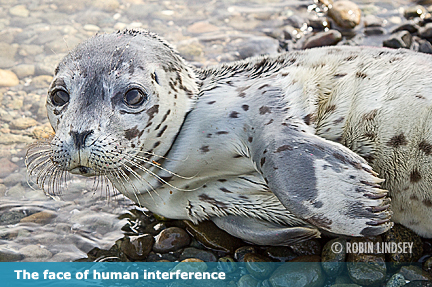
Nursing pups, however, are dependent on their moms for survival for the first 4-6 weeks of their lives. In the waters of Central and South Puget Sound, pups are born from late June through the first week of September (view a map of pupping season in WA). Always stay far back from any pup you come across.
A harbor seal mom, shy and wary of humans, will abandon her pup if people and dogs are around. Use common sense and help protect wildlife from harassment and abandonment.
YOUR PRESENCE CAN CAUSE STRESS AND ABANDONMENT
As you head for the beach, know that seashore revelry is definitely no party for harbor seal pups, who are seeking to rest onshore. Humans and dogs cause pups to be abandoned every year. A harbor seal mom often will not return for her nursing pup if there is a disturbance or perceived threat. It goes without saying that July fireworks cause animals to be abandoned every year.
If you find a spot for your picnic on a beach near a harbor seal, please move your picnic to another beach. There are reports of people with blankets and coolers surrounding a lone seal pup - finally calling the stranding network wondering why the mother did not return.
Weaned seal pups need space to rest undisturbed as well. A pup that is scared into the water wastes precious calories - and this can truly be the difference between life and death.
This is a reminder that when you venture out to the beach, whether by trail or boat, please respect animals’ space and need for quiet. Stay back!
SEALS ARE PROTECTED BY LAW FROM HARASSMENT
Please stay a minimum of 100 yards away from resting seals. Like all marine mammals, they are protected from harassment by the Marine Mammal Protection Act and Washington State law RCW 77.15.130 (a criminal misdemeanor, mandatory court appearance, punishable with up to 90 days in jail and up to $1000 fine).
STAY FAR AWAY FROM HARBOR SEAL HAUL-OUTS
Harbor seals gather in large groups this time of year at haul-outs (called rookeries during pupping season), where moms and pups find safety in numbers. Pups pay a terrible price for human disturbance. The seal pup shown above was found in 2012, starving on Cutts Island, along with two other emaciated pups and several dead ones. All had been abandoned by their mothers because boaters disrupted the seal colony on this small South Puget Sound island near Gig Harbor. Durning boating season, thousands of boats can be moored offshore at Cutts, disrupting this historic harbor seal haul-out.
A day of boating fun for people can be a death sentence for seal pups. When you are boating or kayaking, please stay far away from resting harbor seals.
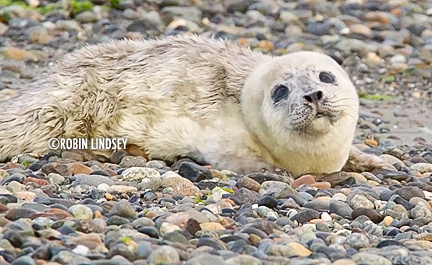
Please contact the stranding network to respond to a lanugo pup.
RESPECT NATURE AND STAY BACK
Leave seal pups be - don’t touch, move or feed them. If you are concerned about a pup, call the NOAA hotline @ 1-866-767-6114. To learn more about harbor seals and pups, visit Seal Sitters website here.
Seal pupping season now underway on Washington's outer coast
May/25/15 08:00 PM
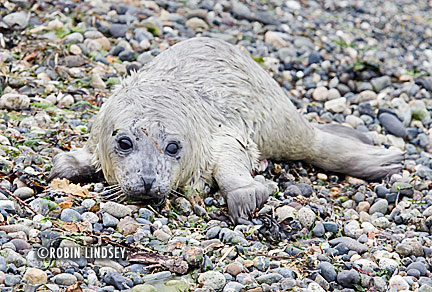
Seal Sitters has also received a report of a live lanugo birth in a South Puget Sound island rookery. Inside the womb, pups have a wavy white coat known as lanugo. For a full-term pup, this long fur is shed before birth. If a pup is born prematurely (with a partial or full lanugo coat), his muscles and lungs will not be fully developed and survival rate is extremely low. The amount of lanugo fur indicates the stage of prematurity.
The photo shown here is of lanugo pup Luigi, born last June on West Seattle’s Alki Beach. A man with a dog was on the beach next to the pup when Seal Sitters first responders arrived. After convincing him he was jeopardizing the survival of the pup, responders cleared the beach and established an extensive tape perimeter, restricting access to the area in hopes that the pup’s mom might return. She was not seen again. A full month premature and weighing only 5.5 kg, she had to be humanely euthanized after 2 days.
At the South Puget Sound rookery on Saturday, WDFW’s marine mammal biologist reports that a boat full of people illegally breached the closed harbor, speeding toward the seal colony where this latest lanugo pup had just been born. The frantic seals were scared from the haulout, leaving the premature pup alone. It is assumed the pup died due to abandonment. Photos of the boat with license number and occupants have been sent to NOAA’s Office for Law Enforcement (OLE) for investigation. If you witness harassment of seals or other marine mammals, a violation of the Marine Mammal Protection Act, please call the OLE Hotline at 1-800-853-1964.
PLEASE, stay back from harbor seal haulouts, where seals gather in numbers - especially during pupping season, now through the end of October in Washington State! It is truly a matter of life and death for seal pups. Observe quietly from a distance. For a map showing pupping timeframes in various parts of the state, click here.
Strange seal pup season continues in West Seattle
Oct/26/14 09:27 AM
The 2014 harbor seal pupping season in West Seattle has proven to be a rocky one. Seal Sitters Marine Mammal Stranding Network’s (SSMMSN) first responders have totaled up 85 responses since lanugo pup Luigi was found on June 9th in the tideline on the busiest stretch of Alki Beach - across from the Bathhouse. Those responses included 24 positively identified pups and 23 dead ones (5 of whom died on the beach or in transport to PAWS Wildlife Center). This almost 50% mortality is the highest rate since volunteer David Hutchinson began keeping detailed response stats in 2011.
*Please note: In the wild harbor seal population, 50% mortality is considered normal for seal pups in their first year. In West Seattle, however, we have not recorded such a high rate in prior years.
A total of 112 responses have been made by SSMMSN first responders to date this year.
SSMMSN AVERAGE ANNUAL STATISTICS :
• 200 responses
• 70% of responses during pupping season (start date is the arrival of first newborn or weaned pup in West Seattle)
• 90% of all responses are to harbor seal pups
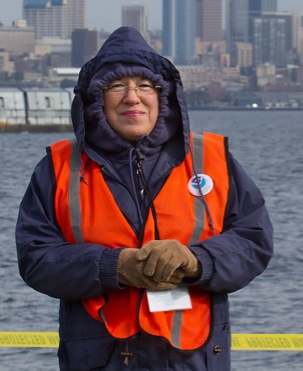 We haven’t had a pup reported onshore this past week, but a few have been sighted in Elliott Bay. The tribal gill nets, stretched out at great lengths across the Bay and Duwamish River, are always a safety concern for unwitting pups who can become entangled and drown. Seal Sitters rescued and freed one such pup a few years ago.
We haven’t had a pup reported onshore this past week, but a few have been sighted in Elliott Bay. The tribal gill nets, stretched out at great lengths across the Bay and Duwamish River, are always a safety concern for unwitting pups who can become entangled and drown. Seal Sitters rescued and freed one such pup a few years ago.
During turbulent weather, harbor seal pups often ride out storms by bottom resting - sleeping on the sea floor and rising every 20-30 minutes to take a breath. Once the weather calms down, pups often need to seek additional rest and, especially, warmth on shore. These thinner, weaned pups have no thick coat of blubber for insulation and energy.
Now that this most recent wind and rain storm has moved through the area, Seal Sitters volunteers (like JoDean at left) are standing by anxiously to help out -rain or shine - should a pup need protection on the beach.
*Please note: In the wild harbor seal population, 50% mortality is considered normal for seal pups in their first year. In West Seattle, however, we have not recorded such a high rate in prior years.
A total of 112 responses have been made by SSMMSN first responders to date this year.
SSMMSN AVERAGE ANNUAL STATISTICS :
• 200 responses
• 70% of responses during pupping season (start date is the arrival of first newborn or weaned pup in West Seattle)
• 90% of all responses are to harbor seal pups

During turbulent weather, harbor seal pups often ride out storms by bottom resting - sleeping on the sea floor and rising every 20-30 minutes to take a breath. Once the weather calms down, pups often need to seek additional rest and, especially, warmth on shore. These thinner, weaned pups have no thick coat of blubber for insulation and energy.
Now that this most recent wind and rain storm has moved through the area, Seal Sitters volunteers (like JoDean at left) are standing by anxiously to help out -rain or shine - should a pup need protection on the beach.
Seal Sitters new volunteer training scheduled for August
Jul/22/14 06:47 AM
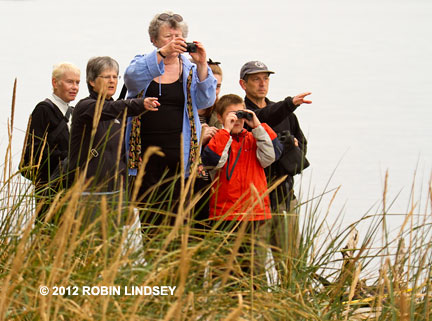
Last year’s record-breaking pupping season stats in West Seattle (from late July’s first response to a newborn seal pup to the end of the year’s weaned pups) included 163 responses to marine mammals, including 66 positively identified seal pups. For a summary of 2013’s activities, click here.
This 2014 season has begun unusually early in West Seattle with responses to one full lanugo seal pup “Luigi”, a second premature pup, and full-term “Junebug” who is now in rehab at PAWS Wildlife Center.
TRAINING DATE:
Saturday morning, August 9, 2014
Time:
10am - 12pm (doors open at 9:30am)
*please note: Plan to arrive early to register and receive paperwork - training begins promptly at 10
Location:
Alki UCC Church 6115 SW Hinds, Seattle (map it)
***A FEW SPOTS OPEN DUE TO LAST MINUTE CANCELLATIONS. Please contact us if you’d like to attend the training.
*Note to parents: All children accompanying adults must be able to sit quietly through an almost two hour presentation (with break).
Seal Sitters MMSN holds several special trainings a year for those wanting to protect marine mammals year-round along the shoreline of West Seattle and the Duwamish River. We are a very active network and have volunteers who travel from around the area to participate. However, if you live out of the West Seattle area and would like to find a stranding network closer to where you live, click here.
Unlike most marine mammal stranding networks, we encourage children to participate in Seal Sitters - supervised at all times, of course, by a parent or guardian. We are so proud of our amazing and dedicated volunteers who are on duty rain or shine - we hope you will join us!
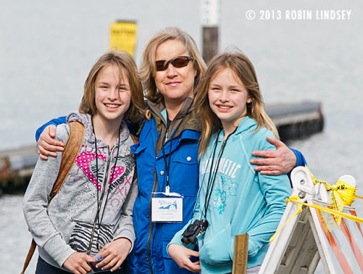
A multi-media presentation will illustrate our educational work in the community and the unique challenges of protecting seals and other marine mammals in an urban environment. Included in the training is an overview of NOAA's West Coast Marine Mammal Stranding Network and biology and behavior of seals and other pinnipeds (due to time frame, supplementary off-season sessions will include more marine mammals of Puget Sound).
For additional questions and info or to be placed on a contact list for future training opportunities, please email us.
Another premature pup in West Seattle
Jun/21/14 07:43 AM
Yesterday morning, Seal Sitter’s first responders followed up on a report of a harbor seal pup in the water “calling” for mom. A homeowner on Beach Drive allowed us through private property to observe the pup just offshore from her home. The pup’s plaintive cry of “maaa-aaa-aa” had been heard since 2:30 am. Consultation with WDFW’s marine mammal biologist confirms that this pup would indeed be premature, as there have not been any recorded full-term births in the South Sound’s harbor seal rookeries - and none are expected till next week.
Since the pup was in the water, we could not assess the coat of the pup to determine how premature he/she might be. The hotline (206-905-7325) received no further reports during the day or evening regarding the pup. If this “preemie” comes ashore, please call our hotline immediately and keep a very low profile - we want to give this pup every chance to survive - and mom’s return is imperative to that goal. If the mom perceives danger from people or dogs, she may not return. If you have seen or heard the pup since yesterday morning, please give our hotline a call with an update as to the pup’s last whereabouts. If the pup is on your beach, please call us so that we may do a telephoto health assessment.
On June 9th, a month-premature lanugo pup nicknamed Luigi was born along Alki Beach. The mom never returned and, sadly, the pup had to be euthanized the following day.
Since the pup was in the water, we could not assess the coat of the pup to determine how premature he/she might be. The hotline (206-905-7325) received no further reports during the day or evening regarding the pup. If this “preemie” comes ashore, please call our hotline immediately and keep a very low profile - we want to give this pup every chance to survive - and mom’s return is imperative to that goal. If the mom perceives danger from people or dogs, she may not return. If you have seen or heard the pup since yesterday morning, please give our hotline a call with an update as to the pup’s last whereabouts. If the pup is on your beach, please call us so that we may do a telephoto health assessment.
On June 9th, a month-premature lanugo pup nicknamed Luigi was born along Alki Beach. The mom never returned and, sadly, the pup had to be euthanized the following day.
Heartbreak as premature seal pup born along Alki Beach
Jun/11/14 06:51 AM
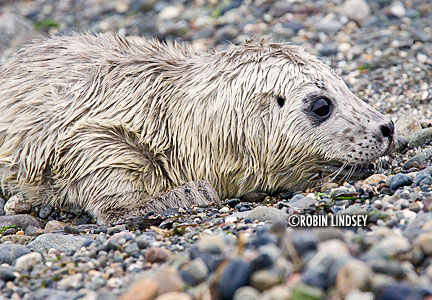
Within minutes, Seal Sitters first responder David and volunteer Eilene were on the scene attempting to establish a protective perimeter with tape and cones, asking people to please stand back. A man with a leashed dog illegally on the beach not only refused to leave the sand, but insisted that it was his right “as a taxpayer” to continue his path past the pup. Apparently, this taxpayer felt it was also his right to break municipal law by having his dog on a Seattle public beach - where dogs are not allowed leashed or unleashed. He finally left after an intense verbal exchange. Another dog owner was nearby throwing a ball into the Sound for his off-leash dog to fetch. We cannot stress enough that dogs are unpredictable and a documented danger to seal pups, causing injury and death to pups in Washington State each year. This was not a good start to our first response of the 2014 seal pupping season.
It was obvious that the surf-soaked pup was a newborn because of the bright flesh-colored umbilicus cord dangling from the pup’s belly. Her body was covered with a long, wavy white lanugo coat (photo above), an indication she was born a month prematurely. A full-term pup will shed this fluffy coat in the womb. We knew this was going to be a difficult situation for both the pup and Seal Sitters, who must try to keep this busy beach area quiet enough that mom might feel safe enough to return for her newborn, who could not survive without her.
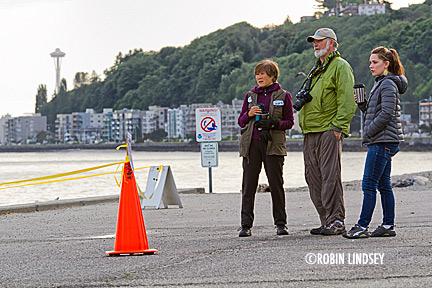
Seal Sitters volunteers tried to keep a low profile at the far ends of the yellow tape boundary, explaining to sympathetic and cooperative onlookers that this pup was believed to have been born that very day. Huge thanks to WDFW marine mammal biologist Dyanna Lambourn for her review of our photos and consultation as to pup’s age and condition.
The pup, nicknamed Luigi, was observed by volunteers throughout the day and discreetly during the dark of night and wee hours of the morning. It was crucial to know if an attending mom would return - no mom ever appeared to our knowledge. During the early morning hours the thin pup moved a bit further up the beach and at first light, the perimeter was adjusted to protect her in what was anticipated to be a warm, and therefore, very crowded day at Alki. Shown in the photo at sunrise with Seattle’s iconic Space Needle in the background are first responder Lynn, science and education advisor Buzz and new volunteer Savanna.
By early afternoon, it became increasingly likely that for unknown reasons, the pup was abandoned with no attending female who would care for this tiny pup. We have no idea what the circumstances surrounding the birth were. Was Luigi born on Alki and mom was scared back into the water by people or dogs before bonding with her pup? Did she give birth just offshore because the beach was busy, but the pup made it to shore alone? Did she die during the birth? If anyone witnessed an adult onshore or very close to shore, perhaps in distress, along Alki Beach Monday afternoon, please contact us. We do know that this pup was too tiny and weak to have swum any substantial distance after birth.
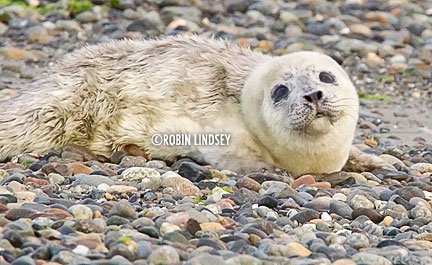
Premature pups - especially one born a month early - rarely survive the lengthy rehab process. If they manage to stabilize for the short term, too often it is only to die shortly after. Nature can be harsh. About 90% of lanugo pups born in the wild don’t survive - and most of those are partial lanugos, not a full month premature. Lanugos require much more maternal care than a full-term pup and some less experienced moms will make the decision to abandon a premature pup whose lungs and muscles may not be fully developed, plus any other factors that may have contributed to an early birth. Even full-term, healthy wild-weaned pups have just a 50% chance of surviving their first year. If a full lanugo pup did manage to make it through rehabilitation and was released, those already daunting odds become even greater against survival in the wild - never having been taught by mom to forage in the expansive waters of Puget Sound. A premature pup’s (for that matter, all pups) best chance is always with mom.
While waiting for authority to transport Luigi for health assessment and as the sun heated up, the pup worked her way down to the water’s edge to thermoregulate and cool down her body temperature. As a crowd of adults and children cried out anxiously, Luigi was swept up in the surf, rolling over and over without the strength to keep from drowning. SS lead investigator Robin donned protective exam gloves (like most animals, seals can transmit disease) and rescued the pup, too weak to swim, from the swirling waves.
Luigi was moved higher up on the sandy beach and we placed an urgent call requesting approval for assessment. That wish was granted and the pup was placed in a kennel and driven to PAWS Wildlife Center in Lynnwood, the only rehab facility in South Puget Sound. Only members of NOAA’s Marine Mammal Stranding Network are authorized to handle and transport marine mammals. It is illegal for the public to touch, feed, move or harass marine mammals.
Sadly, on intake at PAWS, it was determined that sweet Luigi, a female weighing only 5.5 kg (12 lbs, 2 oz) and measuring 70 cm (27.6 in), needed to be humanely euthanized. She was the youngest pup PAWS was known to have received. We thank PAWS for their kindness. We thank, too, our many volunteers who gave Luigi the best chance possible to survive and enabled her to rest quietly on West Seattle’s shore. Luigi gave us all great joy - and educated many people about this special species that is so dear to Seal Sitters MMSN’s heart. On this sad note, we also extend our thanks to the caring public who showed such warmth to our volunteers and to this little seal pup.







